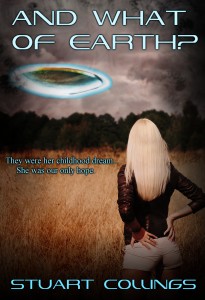After wishing Barb a great night and a quiet shift, she stepped out of the tiny clinic out onto the corner of Twin Elm and Main, and turned left, heading to the south end of town. To her right, the late afternoon sun hovered over the western hills, ceasing its baking of the air and the streets of Jewel.
She took in the emptiness of the town. If hope was nourishment, then Jewel was gaunt with starvation. Ignored or forgotten by three levels of government, its people struggled to survive in the absence of money, employment, or support. They were fellow travellers on a long march to nowhere — each step bringing them individually and collectively that much closer to whatever destiny had in store. As she passed the houses, she waved and smiled at each one that had people sitting on the front stoops. Waved and smiled and recognized their emptiness as being the same as her own.
“Crap, Jenn!” she swore at herself. “You’re getting too fricking maudlin. Things will get better before much longer. Some company will swoop in, buy the abandoned electronics factory and bring jobs and comparative prosperity back to this forlorn little hick town.” Then she added, “Yeah, and maybe we’ll finally send men back to the moon. Dream on, Cupcake.”
Past Amethyst Road, then Turquoise, then Ruby. Coming up to her turn towards home.
“That’s what you’re here for Jenn,” she told herself. “You’re here to rebuild your father — get him able to hope again. To smile at everyone you come across. To brighten their days, if only for a moment.” She sadly shook her head. “How do I spread hope to others when I don’t have any for myself? ‘Physician, heal thyself!’ Like I’ll ever be able to become a doctor–.”
Left on Emerald. Three blocks ahead lay the football field, then a seemingly precipitous drop of the road to the high school. Then the creek, and The Rock — the one place where kids and teens would hang out. She walked diagonally across Emerald, now heading southeast. Past Briar, then Thicket, and approaching Thorn.
As she turned the corner from Emerald onto Thorn, she smelled something wonderful cooking. Seconds later, she saw that her dad was cooking something on the Stone’s barbecue. He almost looked like his old self.
“Smells wonderful, Dad,” she commented, hugging him from the side.
“They were really generous this time — three dozen eggs, two quarts of milk and two pounds of ground beef. I traded a dozen eggs at the store for a loaf of bread, some day-old buns and some honest-to-goodness relish. I harvested one of our tomatoes to add to the burgers. And we have enough meat for at least another 4 meals, I figure.” In another moment or two, the meat was cooked, the burgers assembled, and they went down the slope to their backyard to eat.
Jennifer made a point of looking attentive while her father related the work he had done on the Stevens’ farm. The story of her day was, of a necessity, much briefer and with no highlights to speak of. They sat quietly on the two beat-up garden chairs for awhile after eating.
“Do you want any help with cleanup, Dad?” she asked, breaking the silence.
“No honey. Go for your walk. You need some fresh air. You may run into someone you know from high school.”
Jennifer hoped not, but didn’t say so. “I won’t be out late. Think I’ll hop the fence and wander around the grounds of the school. I’ll be back before dark.” With that, she stood, kissed him on his head and side-vaulted over the backyard fence onto the pile of compacted gravel that sat behind their backyard.
She walked down the scrub-covered gravel slope that emptied into the southern endzone of the dilapidated little high school stadium. To her left, the sun was easing itself behind the rooflines of the houses on Thorn. Ahead, a group of three boys stood around midfield, looking eastward up into the sky. Up on Emerald, above and behind the north endzone, two more people were staring up in an easterly direction, one of whom was pointing.
Jennifer looked up in that direction. In the distance, she could make out some sort of black dot. Not something that should attract any attention. She almost stumbled after her toes hit a divot in the slope. “Crap!” she said under her breath, and took her eyes off the dot and looked where she was walking. Once she got down to field level, her gaze went skyward again.
The dot was bigger. It was descending, seemingly heading straight for the stadium. She quickly glanced over at the boys at midfield. One of them had started backing away. With her attention once again placed on the object, she saw that it had acquired a definite shape. Triangular. Like a lifting-body type of aircraft, except it was descending almost straight down. One of the boys let loose a barrage of expletives. Jennifer winced at the curse words. Looking in their direction, she saw that they were running for the stairs that ran from field level up the 100 feet to Emerald Street. The two people on Emerald had started slowly backing away.
The object was clearly making a controlled descent. It wasn’t a helicopter, or any sort of VTOL aircraft. No exhaust plumes — scarcely any noise at all. And it was getting bigger. Much much bigger.
Jennifer backed up to the western sidelines to give the object more room in which to land. The others were now out of sight. And still the vessel, because quite clearly it was some sort of vessel, grew ever larger.
“Oh wow!” she thought. “This is it. This is really it! First contact!” Followed a moment later with a tongue-in-cheek “I wonder if they know Klingon too?”
The vessel was beginning to look like some sort of stealth aircraft — boxy, angular, black, and big. As it cleared the trees at the eastern edge of the stadium, she came to realize that it had to be at least 200 feet long. The descent was now much slower, still with no exhaust to be seen, and almost no sound whatsoever.
Jennifer tried to control her excitement. She felt she had to appear relaxed and calm and unperturbed when whoever was inside came out. Exude friendliness, she told herself. Be open, friendly, and helpful. Why weren’t there any courses in first contact procedures in high school? You couldn’t hope that everyone who might be part of the first contact group would exhibit any common sense.
The landing pads touched the 8 year old artificial turf, and the vessel gently eased down into its resting posture. Jennifer took two slow steps forward, then stopped and waited for someone to exit the ship. Seconds later, a door opened, and a handful of bipeds dressed head to foot in shiny black and armed with weapons of some kind rushed out to take up defensive positions. “Crap,” she said to herself. “Just like a bad 1950s SF movie. ‘Klaatu borado nicto’.” Another small group of bipeds came out and slowly walked towards her. “Nope. No giant robot.” She took another two slow steps forward and waited. “It’s showtime, Jenn.”


